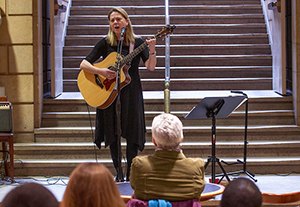New zebrafish lab gives boost to gene-editing research
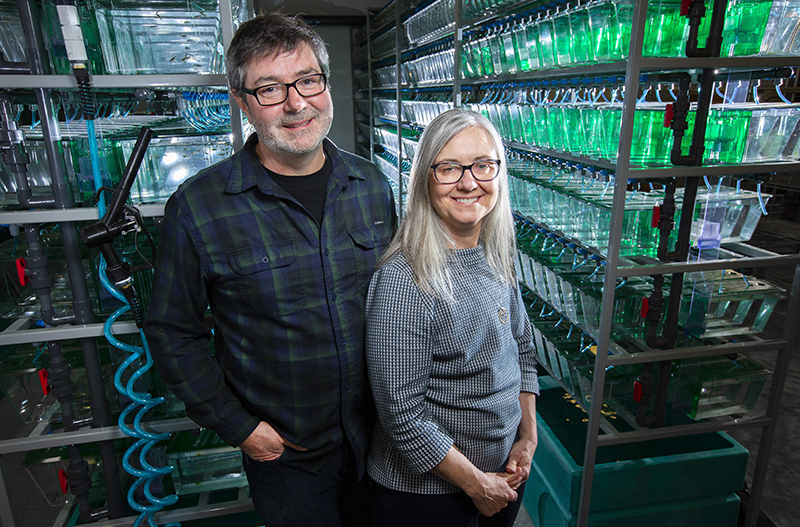
Jeff Essner, left, and Maura McGrail inside their zebrafish research lab in the Advanced Teaching and Research Building. The new facility will hold up to 42,000 fish and require less labor to keep them healthy. Photos by Christopher Gannon.
The rows of new fish tanks in the basement of the Advanced Teaching and Research Building (ATRB) will boost the power of Jeffrey Essner and Maura McGrail's research. By testing in the transparent embryos of zebrafish, they aim to develop gene-editing strategies for applications to create large-animal models of human disease -- and, ultimately, gene therapy treatments for animals and humans.
"We can disrupt different genes and see how that affects organs, how they form, how blood flow happens. These are all processes disrupted in different human diseases. We're modeling what goes wrong in humans," said McGrail, an associate professor of genetics, development and cell biology.
The facility also will mean even more hands-on research and less routine labor for McGrail and Essner's undergraduate students, who maintain a system that could eventually hold about 42,000 fish.
"When they walked in to see this facility, they were just amazed," McGrail said of their student assistants. "Their eyes lit up. It was an exclamation of wonder. This is so beautiful compared to the old facility."
More fish, better data
It's a big deal for the fish, too. Automated, state-of-the-art filtration and consistent temperature and lighting are the chief technological improvements in Essner and McGrail's new lab, built last year with a grant of nearly $750,000 from the Roy J. Carver Charitable Trust. The ATRB facility, less cramped and pungent than their former lab in Science II, should lead to healthier test subjects.
"We like to keep our fish happy. They mate better," said Essner, a genetics, development and cell biology professor.
More of those happy fish is better, as well. The biggest impact of the upgrade is the increased capacity, from 1,200 tanks to 2,800. With each tank holding up to 15 zebrafish, that's an increase of about 24,000 fish. More fish means more data, which means more robust results.
"In developing new technologies for genome engineering, it really requires the ability to generate that many fish to figure out which is the most optimal approach," McGrail said.
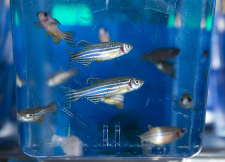
Zebrafish are ideal subjects for genetic research because their embryos are transparent and fertilize externally, making them easier to manipulate.
Why zebrafish?
The zebrafish -- a tropical freshwater species -- is uniquely useful in genetic research because the 400 embryos a female can produce in day are transparent and externally fertilized. That makes them easy to manipulate. They also develop quickly, growing the rudiments of all their major organs within five days and fully maturing in two months. Essner said the zebrafish has the third-best annotated genome, behind only mice and humans. About 70 percent of genes in humans and zebrafish are similar, he said.
"We consider zebrafish a less-invasive alternative vertebrate to using warm-blooded animals like mice and rats," he said.
Essner has been working with zebrafish since he was a graduate student, nearly 30 years of experience. "He's an expert not just in the science, but in the utility of the organism," McGrail said. "We are at a real advantage because of his expertise."
A research team including Essner and McGrail received a four-year National Institutes of Health (NIH) grant in 2017 worth about $3 million, and the upgraded lab will make them even more competitive for NIH grants in the future, they said. They thanked the Carver Trust for devoting the resources to their expansion and the College of Agriculture and Life Sciences for its support.
"We're grateful for the new space and support of our research program and the programs of our collaborators," Essner said. "It was a wonderful gift."
Submit your suggestions and solutions
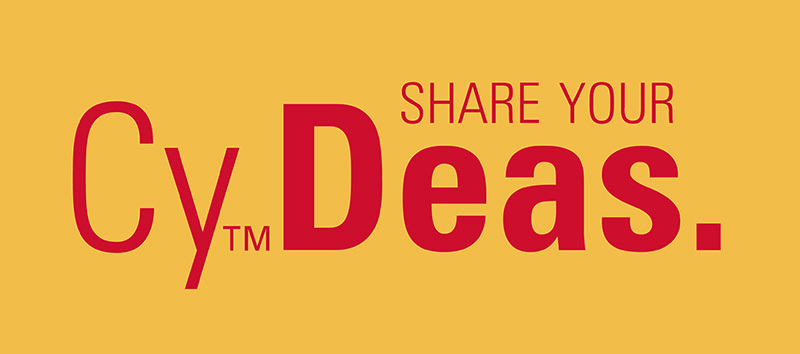
The CyDeas submission form is available on the president's website.
When Wendy Wintersteen was introduced as Iowa State's 16th president in 2017, she said her first order of business was to listen. Nearly 18 months into her presidency, that effort is expanding with the launch of CyDeas, an online platform for collecting suggestions and solutions to improve the Iowa State experience.
"CyDeas is really about tapping into the creative and innovative ideas of our people. Whether it's small improvements -- like more whiteboards and outlets in the library -- or larger issues such as cost-saving measures, we want students, faculty and staff to be able to easily share their solutions to make Iowa State a better place," Wintersteen said. "I appreciate the great work of Elly Sukup, Steve Freeman, ISU Extension and Outreach advancement, and university relations in getting CyDeas off the ground."
Elly Sukup, a program coordinator in the president's office, took on the task of creating the virtual suggestion box and cast a wide net to see what, if anything, other institutions are doing.
"People here are very innovative, and we want to capitalize on that," she said. "I have yet to find another institution our size doing a suggestion or idea platform like this that is university-wide."
Steve Freeman, University Professor of agricultural and biosystems engineering, is helping lead the initiative in his role as faculty adviser to the president. He said the intent is to provide the campus community an opportunity to weigh in with ideas.
"We want people on campus to know their opinions matter, and we want to hear them," he said. "We're also hoping CyDeas will help highlight some process improvements the campus community might not be aware of."
Keeping it confidential
Submissions are anonymous. Students, faculty and staff log in with their Net-ID, but Freeman said this is only for authentication purposes. Names are not included with submissions. Participants have the option to include their contact information at the end of the form.
"We don't want to know who they are unless they choose to provide their name and email. We're asking them to authenticate so we know what type of relationship they have with the university," Freeman said.
An alternate "guest" form is available for individuals without an ISU Net-ID. Guests are asked to select their relationship to ISU, for example, parent or alumnus.
The Qualtrics form is open-ended, allowing participants up to 250 words to suggest an idea, then up to 125 words to describe the benefits (such as savings) of their suggestion and another 125 words to describe how to address it. Participants also are asked to classify their suggestions in one of these categories:
- Improve campus climate
- Reduce expenses
- Increase income
- Reduce wasted time
- Increase efficiency
- Other
An automated response from the system acknowledges submissions, but follow-up will only be possible if users choose to provide contact information.
Turning ideas into action
Sukup and Freeman are leading a "vetting" committee of about a dozen representatives with responsibilities in various campus units, such as student affairs, university human resources and finance. The group will shepherd valid suggestions and solutions to the appropriate areas for follow-up.
Freeman said improvements that stem from submissions will be featured on the CyDeas website. An annual report with success stories and quantitative data, for example submission numbers and category distribution, also will be produced.
"We certainly want to communicate the successes," Freeman said. "We'll also look for theme areas to see where there's more work to be done."
Small changes can have big impact for inclusive classrooms
The question of how to effectively communicate and connect with students who don't identify as gender binary -- exclusively masculine or feminine -- was raised at a recent Faculty Senate meeting. Creating a supportive and inclusive environment for nonbinary, transgender and gender-nonconforming students in the classroom is something all faculty can plan for.
"These conversations are happening everywhere, and it is applicable in every area from engineering and agriculture to hospitality and kinesiology," said Brad Freihoefer, director of the Center for LGBTIQA+ Student Success.
Steps to take
An increasing number of faculty and staff allow students to share information about their gender identity.
"Instead of taking roll call on the first day, pass out a notecard and let students introduce themselves with the name and/or pronouns they want used," Freihoefer said. "By doing that, it truly transforms a class for many of the students we work with. It is important to just listen to the students."
The name on the class roster may not be the one a student desires, and using preferred pronouns shows respect, Freihoefer said. When determining the correct pronouns to use, it is important to consistently ask all members in the class, and not single out individuals.
Mistakes will happen, but the key is to not dwell on them.
"Our system doesn't quite allow for all options for preferred names or pronouns as students would like to use them," Freihoefer said.
Being proactive
Iowa State has added programming to support a more diverse student body. One example is the Inclusive Classroom Workshop available through the Center for Excellence in Learning and Teaching (CELT). It's been offered monthly for nearly three years and more than 300 people completed it.
The workshop focuses on inclusion and gets faculty and staff thinking about changes -- no matter how small -- that can make a big difference.
"It gets them to start to think and learn how they can help make their classroom experience more welcoming for all students, no matter who they are and what type of identities they have," said CELT program coordinator Laura Bestler.
It helps teachers create syllabi and classrooms that are as inclusive as possible. It often brings up topics teachers may not have considered restrictive -- such as questions on surveys or studies that limit options for gender and sexual identities.
"We had students taking pictures of syllabi that had been updated to ask for preferred name and pronouns and posting them," Bestler said. "It creates an atmosphere where the educator in that room cares about all of the students and who they are."
Instructors have begun changing materials they use to bring in other voices.
"When students talk to our staff, it is often to navigate classroom spaces and sometimes the curriculum where they are trying to find inclusivity," Freihoefer said. "Students are asking, 'Where are transgender people, nonbinary people in all of these researchers and history?' They know they are out there and want to get them included in the curriculum."
Resources
The center's Trans@ISU Guide provides a variety of resources, including a template students can use to inform faculty how they identify and want to be referred to in class. The center's website has other tools designed to help faculty and staff:
- On-campus and off-campus training opportunities
- Inclusivity in the classroom aid
- A video on what LGBTQ students want their professors to know
Parking permit rates, Hilton concourse request go to regents next week
A request to begin planning an outer concourse expansion at Hilton Coliseum, and a plan and budget for an addition to the field services building east of the College of Veterinary Medicine go to the state Board of Regents' facilities committee Feb. 27. The board meets Feb. 27-28 in the Reiman Ballroom, Alumni Center. Audio of public portions of the meeting will be livestreamed on the board's website. The agenda also is posted there.
Plans for Hilton would move concessions on the north and south concourses from interior to exterior walls, widening the concourses into the former concessions areas. The new concessions areas would be equipped to serve a greater variety of food. The north and south entrances to Hilton also would receive upgrades, including accessibility improvements. The building's original (1970) mechanical systems and two elevators would be upgraded. Athletics department operating funds and private gifts would cover the estimated $25 million price tag.
The Vet Med college proposes to renovate 1,500 square feet of the existing 9,000 square-foot field services building and add 6,000 square feet, at a cost of $3.7 million. The building simulates an agriculture animal veterinary practice in which veterinary students interact directly with farmers. Caseloads there have more than doubled, and the number of veterinary students on mixed or food animal tracks is rising, as is the volume of faculty field-based research. A 2017 study confirmed a need for a larger facility.
Construction could begin later this spring and last about 15 months. Funds would come from the college, field services, the Veterinary Diagnostic Laboratory and the veterinary diagnostic and production animal medicine department.
Iowa State also will seek the board's permission to enter a five-year lease with Verizon aimed at improving cell phone coverage on campus in anticipation of new 5G technology next year. In the proposed lease, Verizon would install, at its expense, 14 "small cell" structures on campus light poles, including eight on the main campus, five in parking lots near the football stadium and one at the Veterinary Medicine campus. The proposed lease calls for Verizon to pay a signing bonus at the time of installation and a monthly fee for energy use and data connections.
The lease would not prevent ISU from negotiating agreements with other cell service companies. Iowa State already has contracts with Verizon and U.S. Cellular.
The full board will review these three requests at its April meeting in Iowa City.
Parking rates
Employee parking permits would go up 2.6-2.9 percent ($5-$25) on July 1 under Iowa State's proposal to the board. Departmental and vendor permits would go up 5 percent ($10 and $15, respectively). The cost of a motorcycle permit would remain the same, $60.
Permits for the Memorial Union ramp, which is not managed by ISU's parking division, would go up 2.2-2.5 percent ($5-$12) on July 1. The MU proposes no increases to its hourly rates next year.
A first reading of the rates this month will be followed by final board approval in April.
July 1 parking permit increases
|
Permit |
Current |
Proposed |
|
24-hour reserved |
$950 |
$975 |
|
Reserved |
$550 |
$565 |
|
General staff* |
$175 |
$180 |
|
Motorcycle |
$60 |
$60 |
|
Departmental |
$200 |
$210 |
|
Vendor |
$300 |
$315 |
|
MU ramp |
|
|
|
Annual** |
$558 |
$570 |
|
Fall, spring |
$244 |
$250 |
|
Winter |
$238 |
$244 |
|
Summer |
$197 |
$202 |
*Includes Ames Lab and residence department staff
**Includes MU employees
No more leased student housing
Due to decreased demand, the university will stop leasing and operating off-campus apartments on July 1, ending a six-year practice to supplement its on-campus housing inventory. According to the annual residence system report to the board, the projected occupancy rate in university residence halls and apartments is 97 percent next year. Recognizing competition from Ames' private sector and a retreat from record-setting enrollments, residence leaders have a five-year plan to replace all windows and renovate every restroom in residence halls older than 20 years. Combined with planned dining renovations, the residence department will invest about $15 million per year in capital projects through fiscal year 2024.
Residence hall room and on-campus apartment rates for the year that begins July 1 would go up about 2 percent (mostly in the $80-$150 range, depending on the building and room capacity), as proposed.
Flex meal packages and academic year meal plans would increase by a similar range, 1.7-1.9 percent, as proposed. The door rate for guests at campus dining centers would go up 50 cents next year, to $10.50 for breakfast and $13.50 for lunch or dinner.
National institute
Up for final board approval in the consent agenda is Iowa State's request to establish the National Institute of Antimicrobial Resistance Research and Education. In a competitive bid process, the Association of Public and Land Grant Universities and the American Association of Veterinary Medical Colleges designated Iowa State as the host university for the institute. It will be located in the ISU Research Park. The institute expands Iowa State's 2015 antimicrobial resistance consortium with the universities of Iowa and Nebraska, University of Nebraska Medical Center, Mayo Clinic and the U.S. Department of Agriculture’s Agricultural Research Service.
Iowa State also will seek board approval for two program name changes:
- The agricultural biochemistry undergraduate major would change to biochemistry. It's a basic science major with no agricultural requirement in the biochemistry, biophysics and molecular biology department, which is jointly administered by the colleges of Agriculture and Life Sciences and Liberal Arts and Sciences.
- The M.A. in graphic design would change to M.A. in experiential graphic design. The change reflects the evolving and broadening work expected of designers in the profession and sets the program apart from all others in the country (no other school uses this title yet).
Scheduled reports
These Iowa State representatives will make presentations to the board or a board committee next week (and be part of the audio livestream):
- Sara Marcketti, director of the Center for Excellence in Learning and Teaching, will present several success stories in Iowa State's 20-year-old Miller Faculty Fellowship competitive grant program. Audience: the board's academic affairs committee, Wednesday, approximately 1:20 p.m.
- Director of student financial aid Roberta Johnson and her regent peers will assist with an annual report on student financial aid and debt at graduation. Audience: campus and student affairs committee, Wednesday, approximately 2 p.m.
- Senior vice president for student affairs Martino Harmon and assistant vice president for student health and wellness Erin Baldwin will be part of a team providing an update on student mental health and wellbeing and their impact on student retention and graduation. Audience: campus and student affairs committee, Wednesday, approximately 2:20 p.m.
- Vice president for extension and outreach John Lawrence will be part of a team presenting on the three regent universities' outreach and engagement efforts and impact across the state. Audience: full board, Thursday, approximately 11 a.m.
Monday gathering
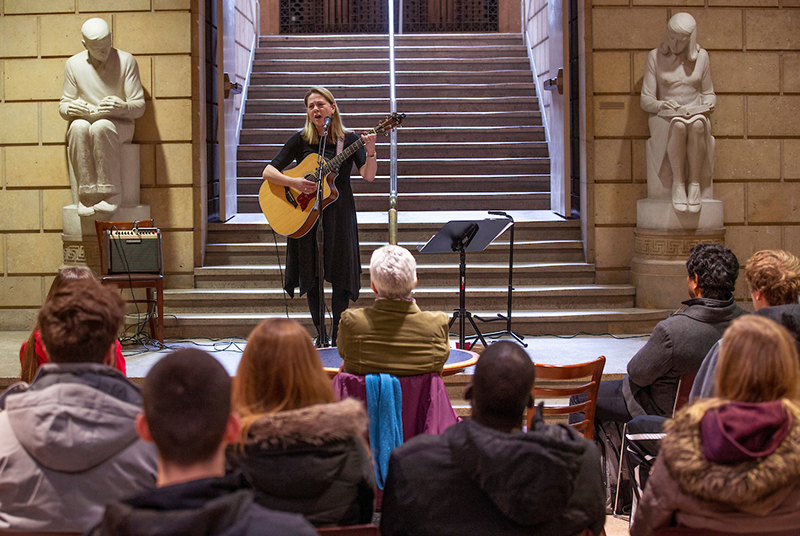
Photo by Christopher Gannon.
English professor and Bone People band member Debra Marquart shared some of her performance poems -- poetry set to original music -- during the Feb. 4 edition of the "Monday Monologue" series in the Grant Wood foyer on the main level of Parks Library.
The next monologue, Monday, Feb. 25, is hosted by the Iowa State Daily and will feature five students. As part of Black History Month, each will share a story about an incident that shaped his or her own life. Monday Monologue performances run from 12:15 to 12:45 p.m. While the library hosts the series, each is curated by a member of the campus community.
